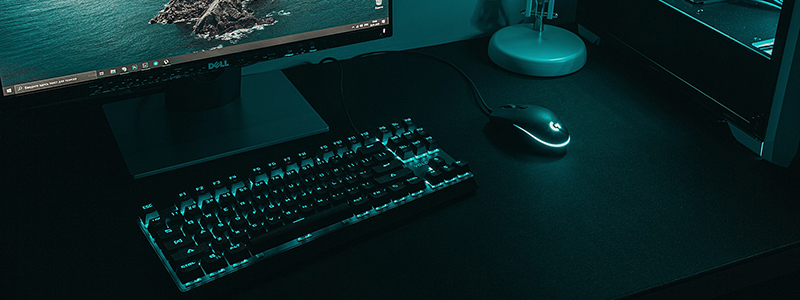
You might well be aware of hacking. It occurs frequently, and others can acquire login credentials to your system and devices over the Internet.
However, it is strange to imagine that hackers can gain access to your computer’s peripherals like mouse and keyboard and utilize it for their personal goals. Sadly, it isn’t as unusual as you may assume.
Hackers and vicious cyber attackers now can monitor or control a user’s input information into a PC within a 100-meter distance by exploiting a security problem in some adapters.
It is frightening for PC and laptop users, but don’t worry. In this post, we’ll explain how your mouse and keyboard can be hacked and how to protect yourself against it.
How are Mice and Keyboards Hacked?
Let’s look at how wireless or Bluetooth adapters function to see how this hacking works. Simply connect the adaptor to a USB socket and activate your Bluetooth mouse or keyboard.
When you operate the keyboard or mouse, it sends information to your receiver, like when you move the cursor, press a button, or input a key. In theory, this opens the door to exploitation.
Consider somebody attaching to your Bluetooth adapter and claiming to be a wireless mouse or keyboard. They would then gain access to that person’s device’s keyboard and mouse. They can then use this access to carry out malicious acts on that machine.
However, tech manufacturers must have considered this and constructed security measures into their adapters. This is correct; however, not all wireless keyboards, as well as mice, suffer from this defect. But, some do, and there’s a tale about how this issue got into the Internet.
AES encryption is used to safeguard most Bluetooth keyboards. Nonetheless, even encrypted Wi-Fi signals may be captured using a Raspberry Pi setup as a Software – defined Radio. One attack captured the user’s protected PC login passwords and replayed them again to decrypt and unlock the system.
The Bluetooth USB receiver is also vulnerable. Even if the keyboard is in a protected session with the dongle, unencrypted input can still be delivered to the receiver and playback to access the associated system and send commands.
How Does the Attack Occur?
To begin with, a hacker attempting to hijack a wireless adaptor does not require pricey special tools. With only an antenna of a few dollars and several lines of Python code, they can connect to any adaptor within a 100-meter radius.
Not something you’d expect to see in a public location!
When a hacker discovers an open adaptor, he or she has two options:
- They can start sending information to the adaptor to simulate mouse and keyboard activity. At this stage, they can reroute the user’s system in ways that the user might not even like them to. A malicious hacker may remove files and directories, but a more devious hacker may instruct the victim’s PC to install spyware.
- Otherwise, they can get access to the adapter and examine what you’re entering. This implies that any passwords or sensitive information input into the wireless keyboard can be viewed by the hacker and used to log into sensitive accounts.
So, this is how the keyboard and mouse can be hacked by malicious hackers and put your data at risk.
Steps to Secure your Wireless Mouse and Keyboard from being Hacked
Following are some of the adoption and implementation and items to consider to ensure device safety and protect hackers from hacking your mouse and keyboards. So, to proceed, follow the steps outlined below.
Device Security
Examine the Bluetooth keyboard and mice security features given by the maker. Because some manufacturers are unconcerned with secure connectivity alternatives, they design devices in this manner solely. Try to choose with a well-known brand or the manufacturer, but this is generally taken care of.
Get Wired Mouse and Keyboard
You will go with a wired mouse and keyboard if you want the easiest but most secure option. This might be a rock-solid answer for your device’s ultimate security, and if you can go for it, you should do so right away. There is no other approach that can compete with this one!
Choose a More Powerful Device
If getting wired is not even a solution, you might consider buying gear with enough privacy built-in. Investigate merchants who do not show on the susceptible device listings and buy the products they offer.
You can also use a wireless mouse and keyboard if your PC supports it, but you should be mindful of the security concerns that Bluetooth raises.
Firmware Update
If you suspect that your wireless keyboard and mouse are vulnerable to hacking assaults, the producer may have released a driver update to address the problem.
You should look for the most recent version of the gadget on the company’s site.
Encrypt Data
The easiest way to prevent your information from being stolen through the wireless mouse/keyboard hijacked procedure is to encrypt the files or folders with a passcode, which will prohibit the hackers from accessing your computer data.
This might not aid you in detaching up towards the hacker’s connection from the wireless link, but it will help you avoid additional difficulties!
Lock Your PC
If you are concerned for the safety of your computer and believe somebody is managing it, you should lock your Computer in the administrator panel. Even though you cannot avoid the previous assault, this will assist you in securing your PC from being accessed by the attacker.
Conclusion
Yes, your mouse and keyboard can be hacked. We have outlined methods that are basic but efficient techniques for securing your wireless mouse and keyboard from hackers and thereby safeguarding your computer data.
All of these approaches will not require you to perform any complicated operations on your computer; instead, you can proceed with your protecting wall development by following a few basic steps.
Simply follow these steps to protect your mouse and keyboard from being hacked.
